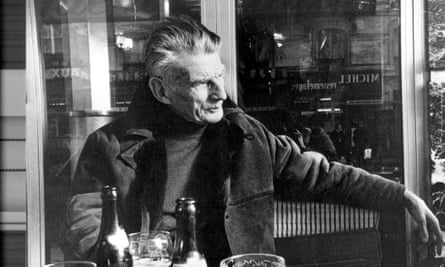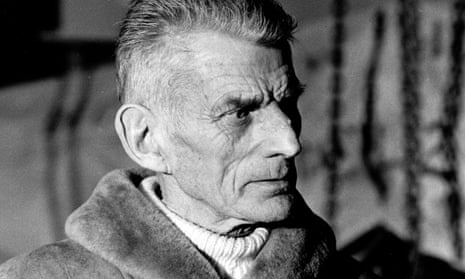In late-1960s New York, a writer and Samuel Beckett superfan called Stephen Block memorised huge chunks of Beckett’s novels Watt and Molloy, “and had begun to worry about having adopted some of their character traits and attitudes”. He wrote to the author “out of desperation, not expecting a reply”, but on 28 March 1968 Beckett sat down in his Paris apartment and wrote to Block, albeit to deny him what he wanted. “I find it impossible to write or speak about my work,” Beckett explained. “My only contact with it is from the inside and I understand very imperfectly the effect it has on readers and critics.” The formulation is encountered again and again in his letters.
While Beckett was notoriously reticent about his work, there were exceptions. Otherwise, how could a project he stipulated be restricted to letters “having bearing on my work” run to four volumes and around 3,000 pages? That said, anyone hoping to find answers to the many riddles inhabiting Beckett’s poetry, short stories, plays and novels will not find them here. “I simply know next to nothing about my work in this way,” Beckett writes to the academic James Knowlson in 1972. “As little as a plumber of the history of hydraulics.”
Yet the letters do throw a remarkable light on the work, and the man. Not an explanatory one exactly, but one that inspires fresh interpretations. In a letter of 1976, for example, Beckett notes of the short, bleak play Footfalls that it is “indeed a strange affair, perhaps unduly elliptic & elusive. But it is not aimed at the intelligence”. That final clause is illuminating about the emotional content of Beckett’s work, and explains why he felt ill-equipped to come at it from an analytical standpoint. Something he understood about art, as well as any practitioner you might name, is that nothing outdoes mysteries that remain mysteries.
The Beckett of the years covered by this fourth and final volume of letters is lionised even before he is awarded the Nobel prize in literature in 1969. Although, in his case, the word “award” is wholly inappropriate: he considered the prize a threat to his creativity (“I hope the work will forgive me and let me near it again”). He was on holiday in Tunisia with his wife Suzanne when his publisher sent a telegram: “In spite of everything they have given you the Nobel prize.” Writing to his lover Barbara Bray a week later, Beckett’s response to his laureateship couldn’t be less effusive: “Here things are pretty awful and little hope of improvement.”
The Nobel turned Beckett into a celebrity. “Damned to fame”, a line from Pope’s Dunciad that Beckett quotes in a letter to Knowlson, sums it up, and Knowlson used the phrase for the title of his 1996 authorised biography. But it is the announcement and eventual publication of the first biography, by Deirdre Bair, that provides one of this volume’s numerous subplots. It begins with a 1971 letter in which Beckett tells Bair he will neither help nor obstruct. “I have nothing to say about my work,” he says, as standard, before advising her to think again “before you embark on such a thankless job”. “I find her sympathetic and believe she is anxious to do a serious job,” he writes a year later, but in 1974 he notes “she is not remarkable, from what I have been told, for strict veracity”. The biography appeared in 1978, and a decade later Beckett is still irked, curtly advising his German translator not to translate “the Bair fantasy”.
If Beckett was ill-served by parts of Bair’s biography, the editorship of his letters provides a model of scholarship and a masterclass in selection. No page in this volume is without a point of interest. Dan Gunn’s introduction (which, alongside those to the first three volumes, would make an excellent freestanding short book) explains why the editors felt able to include letters that don’t strictly obey Beckett’s injunction on the personal. “As Beckett ages,” Gunn explains, “and becomes less willing to manage the practical aspects of the staging of his plays, and as his writing itself seems to be drawn from some ever less public, ever more intimate, part of himself, the line between work and life, never clear, becomes less and less discernible.” Think of the 1981 play Ohio Impromptu, which recalls Beckett’s Sunday walks with James Joyce along L’Allée des Cygnes, and the prose work Company (1980), which describes painful scenes from his early life.
Beckett was one of those rare writers who continued producing at the highest standard throughout his life (the aptly titled Stirrings Still was published in 1988, when he was 82), yet he often cast himself as an artist in decline. “Of me nothing tellable to tell,” he writes to the poet Nicholas Rawson in 1981. “I fare slowly on, in the long farewelling.” And it was a long farewell; already in 1969, directing his plays “right, left, and centre”, and with 20 years remaining to him, he is announcing “there are worse ways of finishing a life”.

It is sometimes difficult to gauge how earnest this elegiac note really is. There is no doubt that despite his protests (“I think we’ve heard enough about my so-called despair,” he told his publisher, critiquing a blurb) he was essentially a pessimist, but the letters clearly show how he enjoyed playing up his Eeyorish persona. “Now such inertia & void as never before,” he writes in 1983 with impeccable comic rhythm. “I remember an entry in Kafka’s diary. ‘Gardening. No hope for the future.’ At least he could garden”. And it is telling that despite unhesitatingly refusing every request to write pieces for newspapers, he complied when the Times asked him to telegram his resolutions and hopes for 1984: “RESOLUTIONS COLON ZERO STOP PERIOD HOPES COLON ZERO STOP BECKETT”.
Soon after Suzanne’s death in 1988, Beckett writes: “I fear I’m beyond repair, body & mind, & ever further with every passing ghost.” Indeed, the entire volume is laden with death. Beckett’s friend Thomas MacGreevy, to whom so many letters in volume one were addressed, dies in 1967; many others follow. Beckett marks them with grim terseness: “Sad days here. My old friend Con Leventhal died here of cancer early this month. A friendship of over 50 years through thick and thin. Now ashes in urn nr 21501 in the basement of Père Lachaise Columbarium.” Eventually the time arrives when Beckett’s sense of his own death’s proximity is no longer false. “I fell,” he writes in 1987. “In a park. Cuts & bruises. Healed now. Marked deterioration this last year.”
At the beginning of his final decade, Beckett wrote to the theatre director Alan Schneider: “Forgive my long silence. No excuse. Just going silent.” A few months later, he describes himself as “one weary with words”. I get a sense that in his final decade, Beckett diverted much of the energy he had put into correspondence into his art, which he found harder and harder to complete. “Very barren patch for me,” he tells Knowlson in 1983. “The wall won’t recede & I have no reverse gears. Can’t turn either.” At the time he had just published Ill Seen Ill Said, and the masterpieces Worstward Ho and Stirrings Still lay ahead of him.
Stirrings Still describes a man on the threshold of death, a man haunted by a “missing word”. There could be no more fitting conclusion for Beckett’s work, which always acknowledged its own inadequacy, as the famous lines from Worstward Ho express: “Ever tried. Ever failed. No matter. Try again. Fail again. Fail better.” And there could be no more fitting line for a dying writer than that from one of the last letters included here, to his childhood friend Mary Manning Howe: “I hope words have now failed me.”
The Letters of Samuel Beckett 1966-1989, edited by George Craig, Martha Dow Fehsenfeld, Dan Gunn and Lois More Overbeck, is published by Cambridge. To order a copy for £29.99 (RRP £29.99) go to bookshop.theguardian.com or call 0330 333 6846. Free UK p&p over £10, online orders only. Phone orders min p&p of £1.99.

Comments (…)
Sign in or create your Guardian account to join the discussion